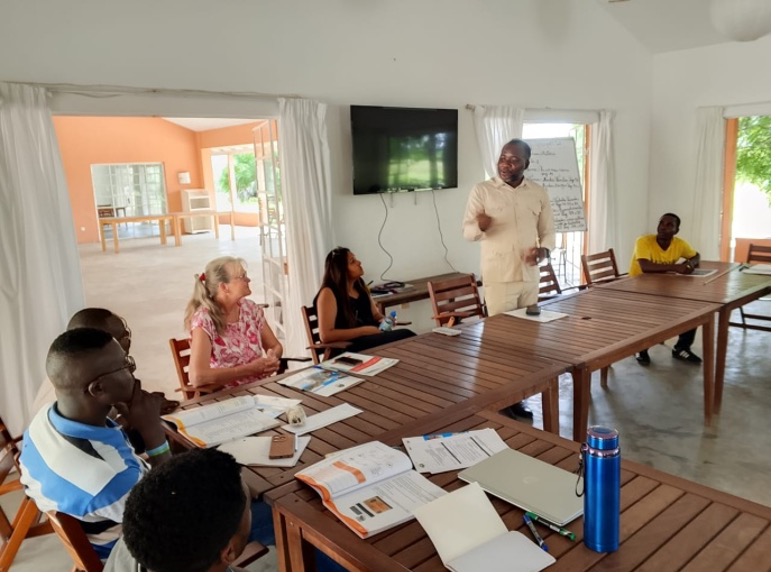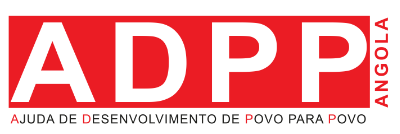
Literacy is one of the fundamental pillars for the development of any country. In Angola, improving literacy rates—especially in rural and hard-to-reach communities—remains a persistent challenge. To address this, ADPP in partnership with the Ministry of Education’s National Directorate for Youth and Adult Education, organized an intensive training course for literacy trainers.
The training took place from 17 to 21 of March at the ADPP Courses and Conferences centre in Luanda. The official opening was led by Dr. Evaristo Pedro, National Director for Youth and Adult Education, who highlighted the importance of strengthening educator training to ensure that all citizens, regardless of age, have access to quality education.
The course aimed train trainers to equip educators working in youth and adult literacy with updated pedagogical approaches, effective strategies, and practical teaching tools to enhance learning outcomes.
ADPP Angola’s Executive Director, Ms. Agneta Dahne, emphasized the importance of the long-standing partnership with the Ministry of Education. She noted: “We have a strong history with the Ministry dating back to 1986, focusing on literacy, accelerated learning, youth and adult education, and since 1995, vocational and teacher training for rural areas.” She also stressed the need for more literacy trainers, saying: “ADPP and the communities need more trainers to continue expanding access to education.” In her remarks, she recalled that ADPP Angola and the MED, through the National Directorate for Youth and Adult Education, signed a Cooperation Agreement on 19 March 2024 to promote functional literacy in Angola. “This training was organized under that agreement, and ADPP is committed to carrying it forward,” she added.
A total of 23 literacy trainers from ADPP community projects participated in both theoretical and practical sessions. These trainers will now go on to train and certify additional educators involved in literacy work.
During the closing ceremony, Feliciano Zeferino Palanga, speaking on behalf of the trainers, stressed the importance of expanding local training efforts to reach more literacy workers. “We came from different parts of the country with the goal of gaining knowledge and leaving here ready to apply everything we’ve learned—methodologies, techniques, and tools that will help spark interest and improve understanding among our future learners,” he said. He also committed to sharing what they had learned with Provincial and Municipal Education Offices where the programme is being implemented.
Closing the event, Ms. Agneta Dahne reaffirmed the role of literacy in both individual and collective development. “We celebrate a victory with each module completed and each activity explored. With the commitment you’ve shown to educating young people and adults, I’m confident that each of you has grown in a unique way. You leave not only with knowledge, but also with new friendships and a support network that can be very valuable going forward,” she said.
Literacy is one of the fundamental pillars for the development of any country. In Angola, improving literacy rates—especially in rural and hard-to-reach communities—remains a persistent challenge. To address this, ADPP in partnership with the Ministry of Education’s National Directorate for Youth and Adult Education, organized an intensive training course for literacy trainers.
The training took place from 17 to 21 of March at the ADPP Courses and Conferences centre in Luanda. The official opening was led by Dr. Evaristo Pedro, National Director for Youth and Adult Education, who highlighted the importance of strengthening educator training to ensure that all citizens, regardless of age, have access to quality education.
The course aimed train trainers to equip educators working in youth and adult literacy with updated pedagogical approaches, effective strategies, and practical teaching tools to enhance learning outcomes.
ADPP Angola’s Executive Director, Ms. Agneta Dahne, emphasized the importance of the long-standing partnership with the Ministry of Education. She noted: “We have a strong history with the Ministry dating back to 1986, focusing on literacy, accelerated learning, youth and adult education, and since 1995, vocational and teacher training for rural areas.” She also stressed the need for more literacy trainers, saying: “ADPP and the communities need more trainers to continue expanding access to education.” In her remarks, she recalled that ADPP Angola and the MED, through the National Directorate for Youth and Adult Education, signed a Cooperation Agreement on 19 March 2024 to promote functional literacy in Angola. “This training was organized under that agreement, and ADPP is committed to carrying it forward,” she added.
A total of 23 literacy trainers from ADPP community projects participated in both theoretical and practical sessions. These trainers will now go on to train and certify additional educators involved in literacy work.
During the closing ceremony, Feliciano Zeferino Palanga, speaking on behalf of the trainers, stressed the importance of expanding local training efforts to reach more literacy workers. “We came from different parts of the country with the goal of gaining knowledge and leaving here ready to apply everything we’ve learned—methodologies, techniques, and tools that will help spark interest and improve understanding among our future learners,” he said. He also committed to sharing what they had learned with Provincial and Municipal Education Offices where the programme is being implemented.
Closing the event, Ms. Agneta Dahne reaffirmed the role of literacy in both individual and collective development. “We celebrate a victory with each module completed and each activity explored. With the commitment you’ve shown to educating young people and adults, I’m confident that each of you has grown in a unique way. You leave not only with knowledge, but also with new friendships and a support network that can be very valuable going forward,” she said.



